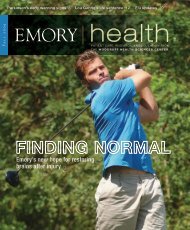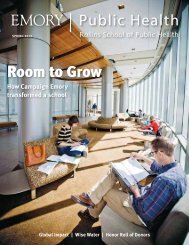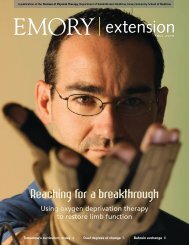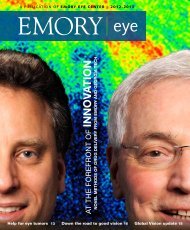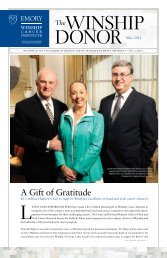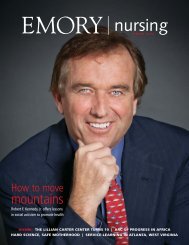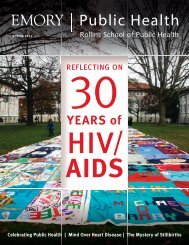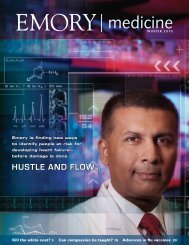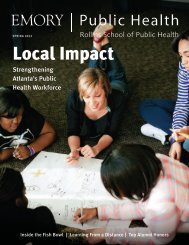returning quality to life - Woodruff Health Sciences Center - Emory ...
returning quality to life - Woodruff Health Sciences Center - Emory ...
returning quality to life - Woodruff Health Sciences Center - Emory ...
Create successful ePaper yourself
Turn your PDF publications into a flip-book with our unique Google optimized e-Paper software.
MOVING FORWARD MORE NEWS<br />
A Cancer Fix<br />
Near the end of 1999, Hamil<strong>to</strong>n Jordan,<br />
former chief of staff for President<br />
Jimmy Carter, and Michael Johns, then<br />
head of the <strong>Woodruff</strong> <strong>Health</strong> <strong>Sciences</strong><br />
<strong>Center</strong>, were discussing the recent<br />
landmark <strong>to</strong>bacco settlement at a<br />
holiday party. The settlement called for the<br />
<strong>to</strong>bacco industry <strong>to</strong> cover states’ expenses for<br />
the treatment of <strong>to</strong>bacco-related illnesses, and<br />
the decision meant that millions of dollars<br />
would soon flow in<strong>to</strong> government coffers.<br />
Jordan suggested that Georgia’s share<br />
of the settlement should be used <strong>to</strong> fight<br />
diseases caused by cigarettes, and Johns<br />
agreed. They both believed that Georgia’s<br />
cancer infrastructure was in dire need of<br />
support. This casual conversation sparked<br />
the serious discussion and action needed<br />
<strong>to</strong> create a coalition that would support the<br />
recruitment of outstanding cancer physicians<br />
and researchers from throughout the country.<br />
Now, more than 10 years later, Georgia’s<br />
cancer-fighting infrastructure is significantly<br />
improved thanks in large part <strong>to</strong> the Georgia<br />
Cancer Coalition (GCC), the organization<br />
borne from that conversation. Launched<br />
in 2001, the nonprofit coalition’s goal is <strong>to</strong><br />
reduce the number of cancer-related deaths in<br />
Georgia and make the state a national leader<br />
in cancer control.<br />
“Our cus<strong>to</strong>mers are the 9.8 million people<br />
of Georgia,” says GCC’s president and CEO<br />
William Todd. “Every year, 40,000 Georgians<br />
will hear those terrible words, ‘I’m sorry but<br />
you have cancer.’ And 16,000 will die. The<br />
coalition and its partners are working hard <strong>to</strong><br />
impact those statistics. We’ve made significant<br />
investments designed <strong>to</strong> move Georgia <strong>to</strong> the<br />
<strong>to</strong>p ranks of cancer care.”<br />
Investing in Georgia<br />
One of those investments involves recruiting<br />
<strong>to</strong>p national and international researchers<br />
through the Distinguished Cancer Clinician<br />
and Scientists program. Since 2000, the GCC<br />
has brought nearly 150 cancer researchers<br />
and clinicians <strong>to</strong> Georgia’s universities and<br />
18 EMORY HEALTH<br />
hospitals, which match the investment.<br />
At <strong>Emory</strong>’s Winship Cancer Institute,<br />
GCC Distinguished Cancer Scholar Fadlo<br />
Khuri is one of the world’s leading authorities<br />
on lung cancer. Leading hema<strong>to</strong>logy and<br />
medical oncology, he has helped recruit<br />
nearly 90 physicians and researchers <strong>to</strong><br />
<strong>Emory</strong> and bring millions of dollars in federal<br />
and foundation research funding <strong>to</strong> Winship<br />
and Georgia.<br />
“I think of our cus<strong>to</strong>mers as the<br />
9.8 million people of Georgia.<br />
Georgia will experience 40,000<br />
new cases of cancer this year.<br />
We’re working hard <strong>to</strong> impact<br />
those statistics.” —Bill Todd<br />
GCC Distinguished Scholars Ruth<br />
O’Regan and Sheryl Gabram are breast<br />
cancer experts who work <strong>to</strong>gether <strong>to</strong> address<br />
patients’ access <strong>to</strong> care. Their research focuses<br />
on triple negative breast cancer, an aggressive<br />
disease that is resistant <strong>to</strong> targeted therapies<br />
and disproportionately affects African<br />
American women.<br />
Also in the coalition’s sights is working<br />
with Winship <strong>to</strong> achieve comprehensive<br />
cancer center designation from the National<br />
Cancer Institute (NCI). Already Winship<br />
is the only NCI-designated facility in<br />
Georgia. Comprehensive status would take<br />
it <strong>to</strong> another level, demonstrating a strong<br />
research foundation with a wide spectrum of<br />
prevention, care, education, and information.<br />
“With this designation, Georgia corrected<br />
the single greatest infrastructure defect in<br />
cancer control in our state,” says Todd. “NCI<br />
designation makes the latest clinical trials<br />
and breakthrough treatments available at<br />
Winship and throughout the state through its<br />
collaborative relationships.”<br />
“GCC’s vision and support has enabled<br />
Winship <strong>to</strong> execute innovative research and<br />
foster true collaborations with oncologists<br />
throughout Georgia,” says Winship’s executive<br />
direc<strong>to</strong>r and GCC distinguished scholar<br />
Walter Curran.<br />
For example, the <strong>Emory</strong> Prevention<br />
Research <strong>Center</strong> and the Southwest Georgia<br />
Cancer Coalition are collaborating <strong>to</strong> make<br />
rural home and neighborhood environments<br />
more supportive of cancer prevention<br />
behaviors. And the Georgia <strong>Center</strong> for<br />
Oncology Research and Education and<br />
<strong>Emory</strong> are conducting statewide clinical<br />
trials in collaboration with community-based<br />
oncology practices.<br />
Return on investment<br />
“Our seed grants give a six-<strong>to</strong>-one return<br />
on the GCC’s investment,” says Todd. “We<br />
put $1 in<strong>to</strong> a seed grant and $6 comes back,<br />
from the NCI and other national and private<br />
foundations.” Although private support plays<br />
an important role in the researchers’ funding,<br />
the majority of support comes from the state<br />
and federal government, primarily via the<br />
NCI.<br />
<strong>Emory</strong> researcher Daqing Wu, for<br />
example, leveraged a $50,000 seed grant<br />
from the GCC in<strong>to</strong> a $720,000 grant from<br />
the American Cancer Society <strong>to</strong> develop<br />
novel targeted therapy for bone metastasis<br />
in prostate cancer. Breast cancer researcher<br />
Hyunsuk Shim’s GCC seed grant likewise led<br />
a research study with NIH and NCI <strong>to</strong> develop<br />
a drug treatment. Jin-Tang Dong also grew<br />
initial research on prostate cancer in<strong>to</strong> a $1.3



